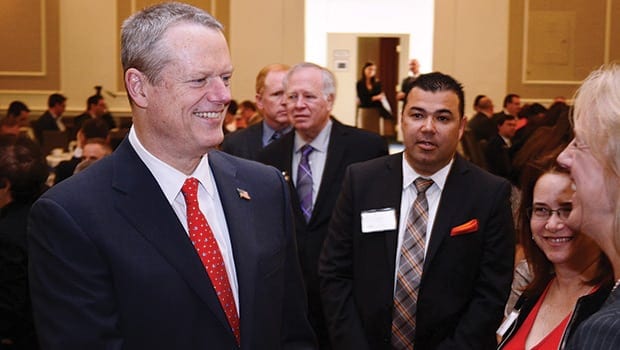Baker: small businesses key to Mass. economy
Small firms create half of Mass jobs

Massachusetts Gov. Charlie Baker had a strong message for the state’s small businesses in celebrating Small Business Week — he knows how important they are for the success of the state’s economy and he will do everything in his power to continue to support their growth.
While speaking at the annual awards ceremony of the U.S. Small Business Administration’s Massachusetts District Office on May 4 in Framingham, Baker acknowledged that small business is responsible for adding half of the new jobs in the state and admitted that any new administration would be remiss to ignore the economic necessity of small business growth.
That’s not an unusual message to hear from a new governor, considering the venue and the audience — the SBA event honored the state’s top businesses with awards ranging from “Small Business Person of the Year” to “Woman-Owned Small Business of the Year” — but one thing that Baker certainly can claim is he knows firsthand how to back small business expansion.
His lengthy business background includes a stint as CEO of Harvard Pilgrim Health Care and executive in residence at General Catalyst Partners, a Cambridge investment firm that backs small business startups. A graduate of Northwestern’s Kellogg School of Management, Baker also served as secretary of Administration and Finance.
Baker’s time at General Catalyst Partners opened his eyes to the power of enterprise. He said he was wowed by how individuals could come in with an idea and figure out how to turn it into a product, and then a business with customers.
“It was amazing to me how big people thought when they came in and talked about these ideas,” Baker said. “If you spend enough time with folks like this you really just start to believe that anything is possible.”
He tied in this experience with the National Small Business Week theme of “Dream Big. Start Small.”
Aspire and grow
For Baker, these kind of big-thinking, small business entrepreneurs that will change the economic landscape.
He points to companies such as travel website Kayak and web-marketing firm Hubspot as examples of small businesses that he saw start small in Boston and grow to be worth over $1 billion.
They did not get there by thinking small.
Baker points to the convergence of growing entrepreneurial ambition and rapidly evolving technology as key factors in the small business rise. Far be it for any young entrepreneur not to think big, but easier access to technology means big dreams can become reality in unprecedented ways.
“The great thing about where technology has gone over the course of the past 10 or 15 years is that it has leveled the playing field in ways that nobody ever thought it could to make it possible for small businesses to compete with just about anybody,” Baker said.
This squares with the idea that small businesses are the real “disruptors” in most industries —small startups come to market, shake up thinking and approaches to servicing or providing products and wrest away market share from those who once dominated.
“That is, in fact, most of the time where the regeneration of business and enterprise and new ideas come from — small players, new players, who see an opportunity and have the guts and the vision, the determination and the perseverance to see it through and to make something of it,” Baker said. “Some of the most ingenious people I have met over the course of my long and checkered career in the public and private sectors have been those small business folks who just find a way — over and over and over and over again.”
Baker pledged that his administration already is hard at work with a number of initiatives that he thinks will continue to ensure the success of the state’s small businesses.
Notably, he has undertaken a complete review of all the state’s business regulations with an aim to eliminate complex and burdensome regulations that slow down the pace of development.
Critics have claimed these efforts actually play into the hands of big business, but Baker strongly disagrees.
“Really big enterprises can always find the structure and the overhead to deal with compliance issues,” Baker said. “I think regulatory review is about small enterprises, small business across every sector of the economy that don’t have the tools and the infrastructure, most of the time, to deal with truly complicated regulatory environments.”
Reduce this complicated regulatory environment and you create more opportunity for small businesses.
Baker is also working with the legislature to create a Main Street development fund to support the growth of local small business and, specifically, keep them in the communities from which they come and serve.
“A lot of Main Streets in and around Massachusetts could benefit significantly from a state and local partnership around rebuilding Main Streets,” Baker said. “It is the small businesses, in many cases, that bring those streets back to life and create the kind of vitality and foot traffic and otherwise that is so critical to creating that sense that we are in fact going someplace.”
Lastly, Baker lauded the state’s status as the U.S. leader in “low-dollar loans” — or loans for less than $150,000. The state also leads the way in loans to business owners from underserved communities.
He said this capital support for small businesses must remain strong and the state will do everything it can to make sure it does.
Baker is not the first to credit small businesses for helping the country emerge from the most recent recession — most economic pundits say so — but he wants to let everyone know he is firmly in this camp.
In fact, he says, that the migration away from a reliance on small business may have been part of the problem that led to the country’s economic downfall in 2008 to begin with.
Count on small business, he says, because it will deliver.
“Small businesses sell to people they know. The people who work for small businesses know the people who run small businesses. It is a face-to-face type relationship that is built on trust, perseverance and in many cases commitments to very similar ideals. It is what makes small business great,” Baker said.






